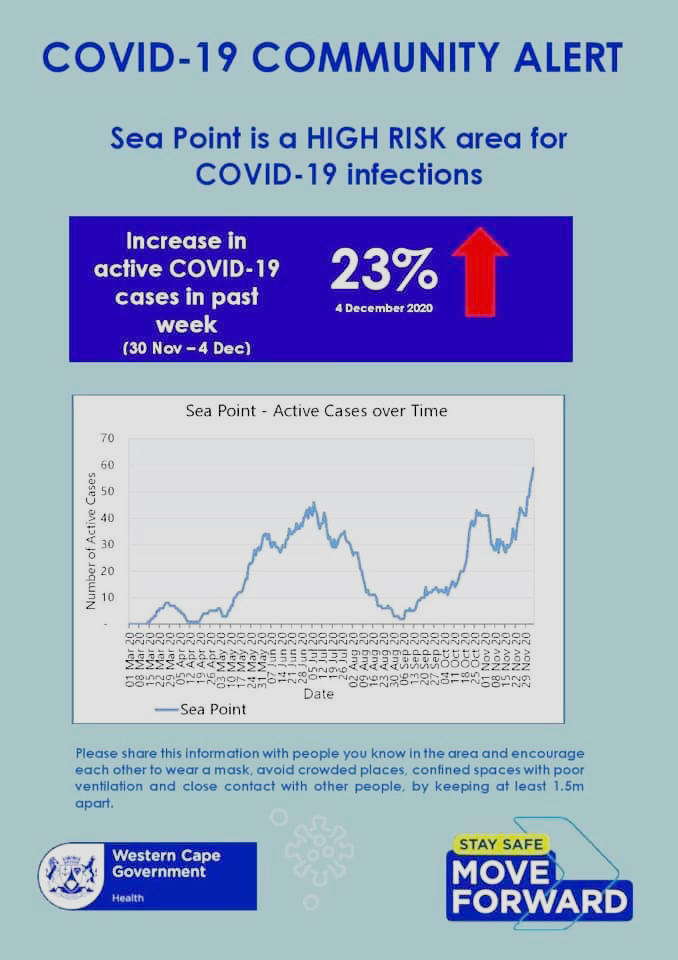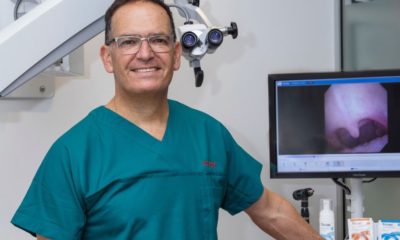
News

Experts plead for adherence to stop second COVID-19 wave
Even before matric Rage was declared a “super-spreader” event, the country was bracing itself for a second wave of COVID-19 infection. Now, as numbers continue to rise, communal institutions are already taking action and experts are pleading with individuals to take responsibility to avoid another peak that could arrive in the New Year.
“Whether or not this is a second wave is mostly semantic. Case numbers are up, hospitalisations are up, deaths are up,” says Jeffrey Dorfman, associate professor in medical virology at Stellenbosch University. His comments come as the Western Cape government released alerts about dramatic increases in active cases of COVID-19 in Sea Point and Milnerton. In Sea Point, a Jewish community hub, the number of active cases in the week of 30 November to 4 December was higher than at the peak in July.
“South Africa is currently experiencing a significant and a seemingly progressive rise in new cases of COVID-19,” says Barry Schoub, emeritus professor in virology at the University of the Witwatersrand and the former director of the National Institute for Communicable Diseases.
“On 4 December, about 4 400 new cases were reported, three-quarters of which came from the Eastern and Western Cape. Coinciding as it does with the start of the holiday season, these figures have given authorities much to be concerned about.
“After a long and trying year, many in the country are gearing up for the annual migration to the coast,” he says. “The festive season is a red flag for COVID-19, not only because many holiday destinations are situated in hotspots of the virus, but also because the holiday atmosphere itself is so conducive to social gatherings and getting away from COVID-19 precautions.”
In Cape Town, the community is already battening down the hatches. On 4 December, Highlands House Home for the Jewish Aged announced that “until further notice, we will be suspending visits by families and friends to residents”. Speaking to the SA Jewish Report, Acting Chief Executive Dr Leon Geffen explained the reasoning for the decision.
“The Rt value in the Western Cape has remained above 1.5 for the past few weeks, in particular the Cape Metro. The number of patients in hospitals with COVID-19 has increased substantially over the past two weeks. Anecdotally, it has been reported that there are many more cases of COVID-19 being identified amongst GPs working in the City Bowl and Atlantic Seaboard. Schools are breaking up, and there is a noticeable increase in socialising among younger people with loosening of the adherence to mask wearing and physical distancing,” he says.
“Since 16 September, we have had more than 1 100 visits to the home from family and friends of the residents. We haven’t had a case of COVID-19 amongst residents since 31 August, and there have been no new cases among staff for the past four weeks. We are mindful that closing the home to visitors will have an impact on residents, their families, and friends, however we must weigh up the risks. As soon as the COVID-19 situation in the Western Cape stabilises and risk of transmission decrease, we will restart visits.”
Also in the Cape, Community Security Organisation Director Loren Raize says, “We have definitely seen an increase in people signing up to the COVID-19 wellness programme. We registered 30 new patients between 3 and 7 December. It’s extremely concerning. If we don’t all play our part, the consequences for our communities and our healthcare system will be devastating.”
In Johannesburg, Chevrah Kadisha Chief Executive Saul Tomson says its residential facilities remain on lockdown to shield vulnerable residents. Supervised visits are allowed and almost all residents have had at least one visit under strict COVID-19 protocols, but these are extremely labour intensive. “We have had no cases of infection from visitations,” he says.
Meanwhile, Hatzolah’s wellness monitoring programme went from four new cases in the week preceding 20 November, to 19 new cases in the week preceding 4 December. Four people were admitted to hospital over that period.
The South African Zionist Federation and youth movements said youngsters couldn’t attend day camps if they had attended matric Rage, reside in the same house as someone who had attended it, or have had direct contact with someone who has tested positive.
Regarding the upcoming holiday period, general practitioner Dr Daniel Israel says, “I’m asked by many patients, ‘Is it still safe to go to Umhlanga, Plett, and Cape Town?’ As far as I’m concerned, the hotspots aren’t the issue, the issue is what you do when you’re at the hotspots. Although it’s back to boring basics, there shouldn’t be a problem if one focuses on wearing a mask, keeping a distance, being in well-ventilated areas, and not letting one’s guard down.
“If you don’t know where someone’s been, and who they’ve been with, even if they are someone who you trust, you’ve got to treat them as a real risk. If you can let that principle govern your holiday, you should be able to look forward to a safe vacation almost anywhere,” he says.
“Some months ago, my colleagues and I predicted that there would be a resurgence or second wave early next year following on the holiday season and the festive spirit and all that goes with it,” Schoub says. “Hopefully these fears won’t be realised, but it’s only human behaviour which can prove the predictions wrong.”
“People should be careful even if not in a hotspot,” Dorfman says. “Some hotspots are picked up slowly because we identify cases inefficiently. And, even in best-case ascertainment, hotspots are identified with delay. The main tools we have to slow it down and flatten the curve are behavioural. Lockdown’s economic costs are too high to implement. Could this be worse than the first wave? I doubt we’ll really know until it has already happened.”










